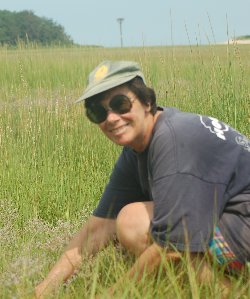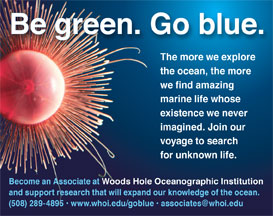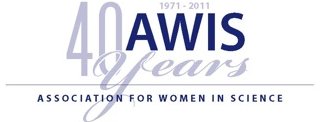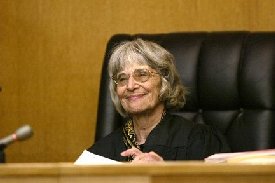| FEMINIST OF THE MONTH - MARCH 2011 JUDITH S (JUDY) WEIS - SCIENTIST, EDUCATOR, ACTIVISTů FOUNDER OF ESSEX COUNTY, NJ NOW  I was born in 1941 in New York City.
Although I grew up in the city, my parents rented places in the country during the summers. When I was seven we
were at the seashore, and I loved looking at shells and other things on the beach. One day I found a hermit crab
crawling around in a whelk shell covered with barnacles, seaweed and boat shells; I thought it was a marvelous
thing, though my mother and cousin did not share my enthusiasm. Another summer we lived near a pond, and I collected
and raised tadpoles to watch them metamorphose into frogs. I was born in 1941 in New York City.
Although I grew up in the city, my parents rented places in the country during the summers. When I was seven we
were at the seashore, and I loved looking at shells and other things on the beach. One day I found a hermit crab
crawling around in a whelk shell covered with barnacles, seaweed and boat shells; I thought it was a marvelous
thing, though my mother and cousin did not share my enthusiasm. Another summer we lived near a pond, and I collected
and raised tadpoles to watch them metamorphose into frogs. My parents, Saul and Pearl Shulman, a lab technician and a housewife, encouraged my scientific interests and put no limitations on my goals. This was rather unusual in the 1950s, when so many girls were told they should become nurses, schoolteachers, or housewives, and it was probably due to my being an only child. I think if I had a brother, it would have been very different. My scientific interests were fostered by frequent visits to the American Museum of Natural History, and later by attending the Bronx High School of Science, where it became clear that my major interest was biology. The school offered many advanced courses in the sciences, though most students there attended because of the general high quality of the school, rather than a strong interest in science. Having an atmosphere where the other students are bright and interested in learning was very important to me. Speaking now with contemporary female graduates, none of us can remember any incidents of put-downs of female students or any disparaging remarks by teachers or guidance counselors that were very common back then in other schools. I think I was non-perceptive and oblivious (in a good way) and managed to be somehow unaware of societal pressures and expectations for women's roles; I just barreled ahead doing what I was interested in. I attended Cornell University 1958-1962 where the freshman Zoology course seemed designed to "turn off" as many students as possible, and where female scientists were non-existent. I, nevertheless, persisted in my interests. After my sophomore year, I planned to volunteer at the AMNH doing research and found myself being interviewed by a female (!!) scientist who would be spending the summer at Woods Hole Oceanographic Institution in Cape Cod MA, and needed a part time lab assistant and part time baby sitter.  So I didn't spend my summer in the city after all. I studied fish schooling in the mornings and babysat at the beach in the afternoons. And I saw that women could indeed be biologists, although my mentor, Dr. Evelyn Shaw, was from a generation that had faced even more barriers entering science and was a rather tough cookie, not an ideal role model. I hoped I would not have to become exactly like her. I spent the following summer at Woods Hole also, taking the Marine Ecology course. I met many other young people with a similar passion for marine biology, including Pete Weis who eventually became my husband and frequent collaborator. We got married right after my graduation in 1962, so rather than attending graduate school at Yale, I settled for NYU so as not to have a commuting marriage. The NYU Biology Dept. had one "fish guy" who was the only suitable mentor for someone with my interests. He had never had a woman student in his lab before and didn't know what to do with me-he apparently thought I'd melt if I got wet or pulled nets in the water. Not being able to confront him on this, I agreed to do lab-based research, and since the lab was full of fish that were breeding, got interested in fish embryology. So I ended up with a dissertation on fish development with most coursework in ecology, oceanography, marine biology, and fisheries. I defended my dissertation while seven months pregnant, and our daughter Jennifer was born the day after graduation - planned parenthood in action! I had been job-hunting that semester, and in 1967 interviewing while obviously pregnant was not an advantage. Nevertheless, I was hired at Rutgers Newark as a developmental biologist, given a salary that turned out to be far lower than others, a lab that was far smaller than others, a small startup package, and told "Welcome to Rutgers. Publish or perish." Nevertheless, I was happy, used my time efficiently, published and succeeded. There were already three women in the department, all supportive. A couple of years later we had our second child, Eric, who was planned to come during intersession, although he came early during final exams.Being able to balance work and family was due to my husband Pete playing an equal role at home, and having a wonderful nanny. In the early 1970s I got involved in the women's movement at school, and in the outside world through NOW. I had not previously been aware of women's issues and had felt that since I had a career, the women's movement was not important to me. I had a conversation with a contemporary male colleague in my department, who expressed the opinion that women faculty should not coordinate a large freshman course because they could not get the respect of all the graduate students who would be teaching assistants, and they could not do the administrative work needed to run a large course. This was the "click experience" that instantly raised my consciousness and sent me to NOW. I attended a meeting that weekend in NYC, picked up hundreds of flyers, bought a lot of books and suddenly my life was changed. Finding no NOW chapter in Essex County NJ where I lived, I started one, recruiting women friends and acquaintances. We filed lots of complaints about the segregated help wanted ads, filed some of the early Title IX complaints about the tracking of boys to shop classes and girls to home economics.
Before the government could get involved, just about all the school systems in the county made both classes mandatory for all students. Our action that got the most press attention was the Little League case that eventually won the right of girls to play in the Little League; this was my 15 minutes of fame in the women's movement. The presiding officer in the case was the late Sylvia Pressler, whose quote that the Little League is as American as apple pie and motherhood and should not be denied to girls - was the quote of the day in the NY Times. At Rutgers, a women's faculty organization at Newark obtained data from the Dean showing that women were getting lower salaries and slower promotions than men with comparable seniority, productivity, etc. The group filed charges, using the names only of tenured women in public documents. This protective action, led by the late Professors Helen Strausser (Zoology) and Dorothy Dinnerstein (Psychology) probably saved the jobs of those who were untenured; women at other universities involved in similar activities often found themselves out of a job later. Eventually, we won the case that was not a lawsuit but a complaint to the then-Dept. of Health Education and Welfare. We got salary increases plus back pay. After a few years, my research moved back into a more environmental direction. Learning about harmful effects of contaminants, I became interested in policy, particularly after seeing the distressing environmental policies of the Reagan administration. I spent a year in Washington as a Congressional Science Fellow sponsored by the American Association for the Advancement of Science and American Society of Zoologists, working for the Senate Environment and Public Works Committee on issues including drinking water, pesticides, and hazardous wastes. That experience opened my eyes to the fact that science is only a small part of what goes into decision-making. Since then, I have spent additional years in Washington at the National Science Foundation and Environmental Protection Agency. I thought briefly about a career switch, but opted to stay in academia and influence policy through advisory committees. I have served on many advisory committees to EPA, to National Oceanic and Atmospheric Administration, NJ Department of Environmental Protection, and the National Research Council. I also became involved in professional organizations, and was president of American Institute of Biological Sciences in 2001. I initiated efforts to combat the increasing influence of creationists in the schools.  I have also been active in the Association
for Women in Science and served on their board. At Rutgers I particularly enjoy mentoring graduate students; in
the early years, mostly men, but in the later years mostly women. I am the Newark co-coordinator of a university-wide
NSF "Advance" grant for supporting women in science. In this project, we are focusing most of the attention
on junior women science faculty who have not yet gotten tenure. Our children did not become scientists, although
they appreciate science; they became a travel writer and a trail planner. I have also been active in the Association
for Women in Science and served on their board. At Rutgers I particularly enjoy mentoring graduate students; in
the early years, mostly men, but in the later years mostly women. I am the Newark co-coordinator of a university-wide
NSF "Advance" grant for supporting women in science. In this project, we are focusing most of the attention
on junior women science faculty who have not yet gotten tenure. Our children did not become scientists, although
they appreciate science; they became a travel writer and a trail planner.Science, feminism, and the environment are not my whole life. I am also very interested in music and participate in choral societies and light opera groups. I also love swimming and traveling. I am particularly happy spending time with our three granddaughters, two of whom live in California and one in Rhode Island. It distresses me to see that the aisles in toy stores are still labeled "girls toys" and "boys toys." There has been a fair amount of backsliding since the 70s - something I didn't think would be possible at that time. But certain important things that we accomplished are irreversible and have greatly improved women's lives and status in our society. But there is still an enormous amount of work to be done before we achieve true equality. Contact Judy: jweis@andromeda.rutgers.edu Comments to Jacqui Ceballos: jcvfa@aol.com Back to VFA Fabulous Feminists Table of Contents |
